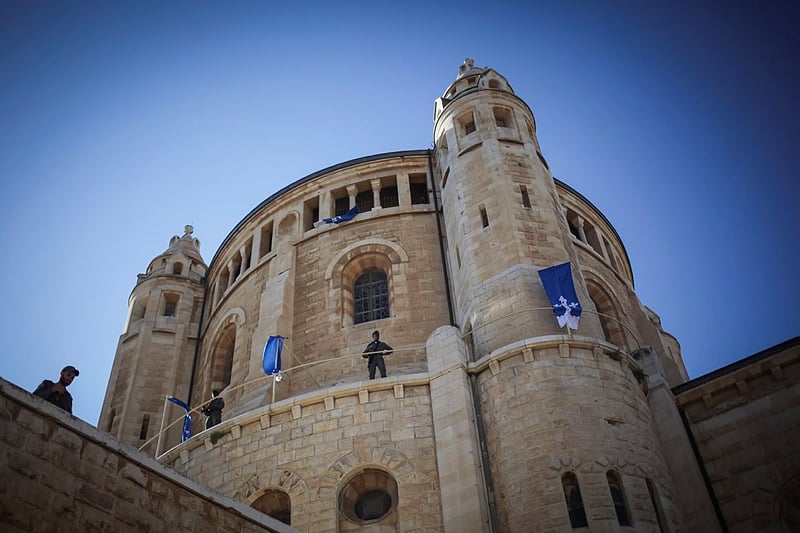By Rabbi Ari Enkin, Rabbinic Director, United with Israel
King David’s Tomb may or may not contain the remains of the great Jewish monarch, but the site was nevertheless made holy by the prayers and tears of Jews who have visited for hundreds of years.
King David’s Tomb is a popular and widely visited site on Mount Zion, just outside the walls of Jerusalem’s Old City. It is managed by the Diaspora Yeshiva, located adjacent to the tomb. The actual tomb is located in a corner of a room situated on the ground floor of an ancient structure believed by some to be the site of the Cenacle. The cenotaph located at the Tomb of King David was erected by the Crusaders.
It seems that the current site of “King David’s Tomb” has only been known as such since the 12th century. According to Benjamin of Tudela (circa 1170), the tomb was discovered during repairs to a church that used to be on that site. As the story goes, two Jewish workers who were employed by the Church to carry out some repairs on Mount Zion accidentally came upon a secret passage which led them to a palace made of marble columns. Inside the palace was a table, and on the table was a golden scepter and a golden crown. The workers then decided that this was King David’s Tomb. They then reported hearing voices that told them to leave immediately. In the 14th century, the church was closed as the result of a dispute between Franciscans and Greek Orthodox sects.
While the aforementioned story is great apocryphal reading, the impetus for the site being declared the Tomb of David may be related to the story of David’s conquest of Mount Zion as described in the Book of Samuel.
After the Israeli War of Independence in 1948, Mount Zion, and by extension, the Tomb of David, was left on the Israeli side of the Green Line. As a result of Jews being barred from visiting the Western Wall while it was under Jordanian occupation between 1948 and 1967, the Tomb of David became a major destination of pilgrimage. In addition to being a holy site in its own right, it was essentially the closest Jews were able to get to the Temple Mount.
King David’s Tomb (Flash90)
The authenticity of the site has been the subject of much discussion since the day it was “discovered” in the 12th century. There may be more reasons why the site is unlikely to house the remains of King David than there are reasons to support it. For one, the Bible says that King David was buried in the “City of David” together with his forefathers. The ancient City of David is by all accounts located below the Old City, in the area known as Silwan – not in the area of Mount Zion above the Old City. Indeed, in 1913, French Jewish archaeologist-Egyptologist Raymond Weill found eight elaborate tombs down in the City of David, which archaeologists later interpreted as strong candidates for the burial site of the former kings of Jerusalem. (For more information on this area located at the heart of Jerusalem, visit cityofdavid.org.)
There are also the 4th-century accounts of the Bordeaux Pilgrim and Epiphanius who make mention of seven synagogues that had existed on Mount Zion, but there is no mention of David’s Tomb being located in the area. Actually, the “Pilgrim of Bordeaux” claims to have discovered the Tomb of King David in Bethlehem along with Ezekiel, Jesse, Solomon and others. This, too, contradicts the biblical account.
There is also the theory that Christians inherited the belief that the site was King David’s tomb from local Muslims, which eventually influenced the Jews to subscribe to this view. In fact, there is evidence to suggest that the area known today as Mount Zion was not part of inhabited Jerusalem in King David’s time.
Whether or not “King David’s Tomb” really contains the remains of King David has little practical relevance. What is for sure is that the site is unquestionably a holy place because it has been sanctified by the visits of Jews for hundreds of years. Their tears and prayers are what make a site holy.
Do You Love Israel? Make a Donation - Show Your Support!
Donate to vital charities that help protect Israeli citizens and inspire millions around the world to support Israel too!
Now more than ever, Israel needs your help to fight and win the war -- including on the battlefield of public opinion.
Antisemitism, anti-Israel bias and boycotts are out of control. Israel's enemies are inciting terror and violence against innocent Israelis and Jews around the world. Help us fight back!
